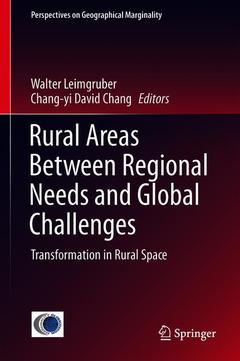Rural Areas Between Regional Needs and Global Challenges, 1st ed. 2019 Transformation in Rural Space Perspectives on Geographical Marginality Series, Vol. 4

Walter Leimgruber, Chang-yi David Chang: Introduction: Rural space, between marginality and vital importance
Part 1 Theory and methods
· Miroslav Marada, Spatial differentiation of human and social capital: A case study of peripheral and rural regions in Czechia· Vladimir Ira, Impact of rural restructuring on the time-space behavioural
· Hayeong Jeong, Kakuya Matsushima and Kiyoshi Kobayashi, Identity and Community Actions in Marginal Rural Areas
Part 2 Transformation processes
· Krystian Heffner, Rural Labour Markets and Peripherization Processes in Poland
· Steve Déry, Maëva Lucas and Louis Boisclair, Agrarian and urban transitions in Lam Dong province, Vietnam: adaptation or marginalisation for ethnic minorities?
· Maria Eugenia Cepparo, Advances in marginality studies in southern Mendoza, Argentine
· Margarita Schmidt, The local-global interaction in the Uco valley (Mendoza, Argentina): overcoming marginality or increasing heterogeneity?
Part 3 Primary activities
· Chiung-Wen Chang, An alternative agriculture space in a Taiwanese tribe, Kalala
· Yasutaka Matsuo, Restructuring of Japanese forestry and the current condition for the sustainability of more advanced forestry regions
· Tony Binns & Etienne Nel, Urban agriculture in Zambia
Part 4 Towards a multifunctional rural space
· Kristijan Nemac and Stanko Pelc, The role of Slovenian traditional handicrafts in present time rural development
· Céline Burger, Windfarms in champagne-Ardenne Region. An assessment of the acceptability and local governance issue
· Steve Déry, Lucie Dubé and Bakham Chanthavong, Protected areas and the integration process of mountainous areas in mainland Southeast Asia: the case of Luang Nam Tha, Lao PDR· Ai Sugie, Deconstructing financial inclusion and exclusion in the development discourse: case studies of microfinance operations in rural Bangladesh
· Etienne Nel, Small Town Development in New Zealand: Responses to Marginalization
Summary and conclusions
Chang-yi D. Chang, Walter Leimgruber, Which future for rural space?
Chang-yi David Chang is currently the Chair Professor, Environmental and Development Program, Dharma Drum Institute of Liberal Arts. He was the chair of IGU Commission on Islands (2006–2016) and serves as a member of IHDP GLOLAL Change Commission, Academia Sinica, Taiwan. His research interests include environmental resources conservation and management in marginal regions. He is a member of international editorial advisory board of Geographiska Annaler, series B. He also published the book “Environmental Struggle in Taiwan” with professor J.F. Williams at Michigan State University in 2008. He was a Professor at National Taiwan University, where he taught at the Department of Geography from 1976 to 2010. He was the President of Geographical Society of Taiwan and the chair of IGU National Committee-Taiwan from 1999 to 2003. As a volunteer worker, he has also served as the President of the Taipei Yunhe Community University, which supports adult continuing education and social reform since the year 2000.
Provides insight in the diversity of marginalization and demarginalization trends
Examines rural areas around all five continents of the world
Contributes to the on-going discussions on geographical marginality
Date de parution : 01-2019
Ouvrage de 312 p.
15.5x23.5 cm
Disponible chez l'éditeur (délai d'approvisionnement : 15 jours).
Prix indicatif 105,49 €
Ajouter au panier

